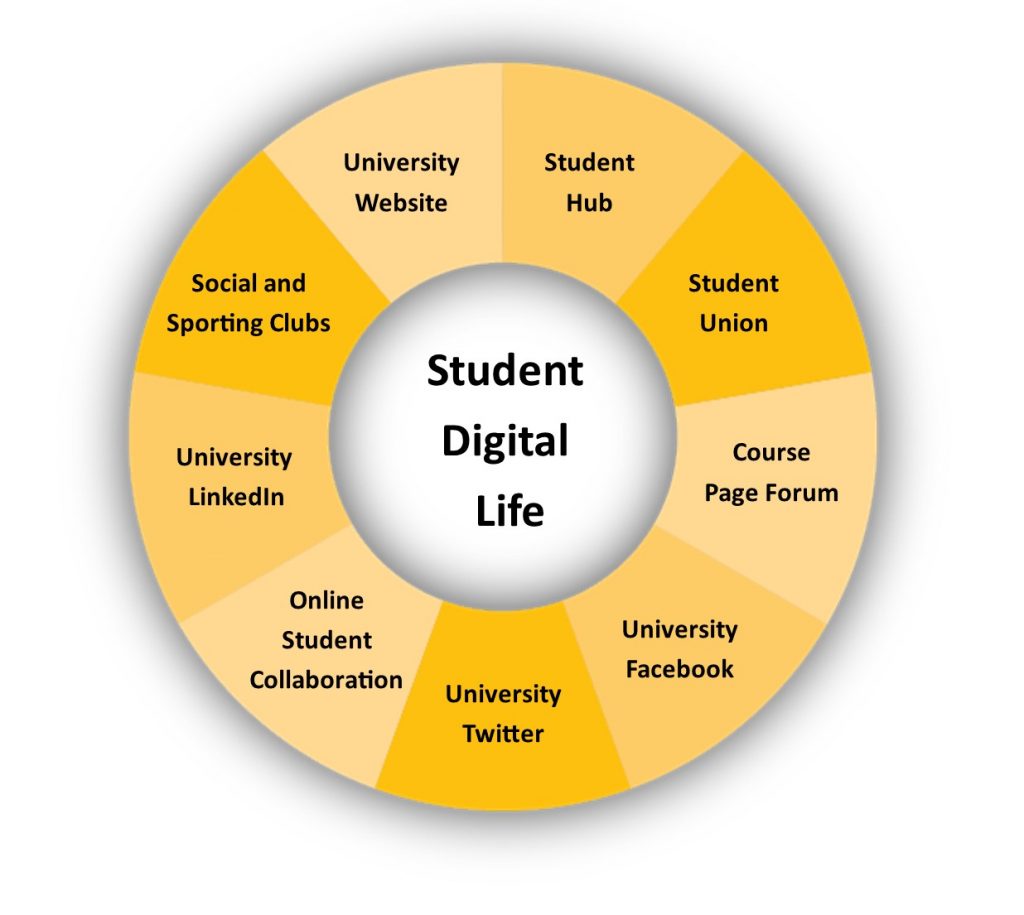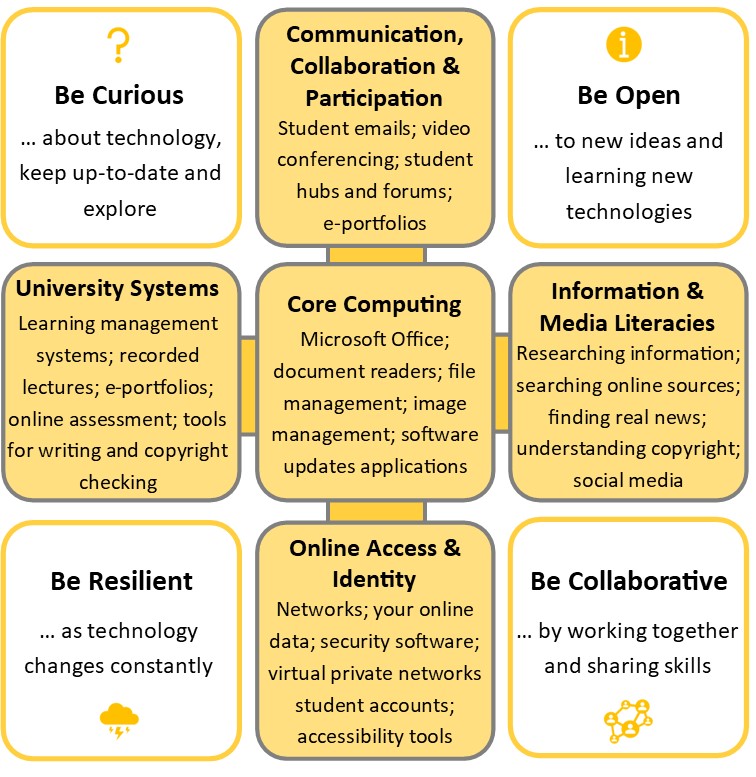University Life Online
Marjorie Jeffers; Yvonne Rose; Karanpal Singh Sachdeva; and Robyn Tweedale

INTRODUCTION
The 21st century university is highly technological and much of university life is lived online. To succeed at university, a student must be confident to operate online and be digitally literate. This means being able to understand, use, adapt to and innovate with technology. This chapter begins by exploring why digital literacy is important and how it is relevant to university life. Next, it examines what universities will expect of you in terms of digital life. The chapter then outlines the digital attitudes, attributes and skills you will need to develop, and how these relate to other skills and attributes, such as finding information online. By developing each of the elements that will be discussed in this chapter, you will be well equipped for online university life.
DIGITAL LITERACY AND UNIVERSITIES
People develop digital literacy throughout their lives. From using a mobile phone or typing a document, to manipulating data and engaging in social media, digital literacy is an important facet of every part of your life. It is helpful to build your capacity to be digitally literate as you progress. When you come to university, most likely you will not be familiar with the systems, technologies and environments that you will be expected to use throughout your study journey. It is important to become familiar, and develop these skills. You will also learn skills and attitudes with technology and digital environments that will help you in the rest of your life.

Online environments are now a key part of universities. You will not be able to succeed at university without access to relevant technology and systems. You will need to use email, learning management systems, online collaboration and videoconferencing tools and many other systems. Most information is online these days. Things like online course readings, online journals and e-books are commonplace in modern education. You may even need to build a social network online to communicate and collaborate on team projects and assessments.
It is also important to learn about the threats to you that online life can bring. Threats to your privacy, professional image, and academic success can be magnified if you don’t live your life online securely, safely and ethically.
Everyone needs digital literacy to succeed in all aspects of their lives -learning, working and living. As a university student, you must be committed to developing your digital literacy within your academic, professional and personal life. Universities are committed to providing opportunities to develop digital literacy as part of your work and study.
WHAT IS A DIGITALLY LITERATE STUDENT?
Being digitally literate means having the skills, knowledge and attitudes that equip you for living, learning, working and flourishing in today’s technological society. All elements of these skills, knowledge and attitudes are interrelated and interdependent.
Digital literacy attitudes include being curious, open to learning, resilient to change in technology and being collaborative. Digital literacy skills encompass elements such as:
- core computing and networking skills and knowledge to operate in a university environment (which underpin the other elements); (see below for more information)
- skills and understanding about information sources and the media, so you can access the information you need to study and work, and ensure that it is the right information;
- the ability to create online objects such as assignments, images, presentations, audio, video and other things such as spreadsheets or data;
- participating in online discussions, collaborations, groups and communicating effectively and appropriately online;
- being able to use the online learning systems at your university and beyond for ongoing professional development and learning; and
- being able to manage your “digital identity” at university and beyond into professional life and be ethical, responsible and legal in your online life.
You will develop digital literacy throughout your university journey and throughout the rest of your life. It is important to understand that digital literacy is:
- Scaffolded, so you don’t need to know everything from the start, and you will build on your knowledge and skills as you learn.
- Supported as your university will provide you with opportunities to learn new skills and develop your understanding and attitudes to digital technologies and online learning. Look for opportunities through orientation, information technology (IT) training, library training, study support training and online resources.
- General as some skills and capabilities are important for all students, and Specific as other skills and capabilities are specific to a discipline or profession; and some disciplines and professions will require a much higher level of expertise and ability than others.
YOUR ONLINE LIFE AT UNIVERSITY
Starting university is a time when you will begin to collaborate online with others, either in your course or in the wider university social networks, whether it is in forums run by your lecturer, or via the university’s social media platforms, such as Facebook and Twitter. Interacting with your lecturers and fellow students online will present additional chances to collaborate and co-operate to facilitate high levels of engagement. Your ability to navigate and interact in a positive way using these education and social environments will broaden your learning experiences and expedite understanding. All these lead to success both in your studies and your professional life.
Figure 8.3 represents some of the many technologies and environments that universities provide for students that make up their student digital life.

There are many positives to engaging with the platforms offered by your university. You will broaden your access to learning environments and be able to create networks with your colleagues and peers, as well as experts and mentors in your field. You will develop your online identity and improve your online interpersonal skills through communication in university systems and social media platforms. You will also develop digital problem-solving skills, and learn to innovate and create in online environments. The student digital life will involve accessing both official university sites and, on occasions, unofficial sites. Some of these include:
Table 8.1 Digital tools and collaboration opportunities
| Official University Facebook Site | Awards, programs, partnerships, promotional materials, advertising “days” e.g. ANZAC Day, Harmony Day, graduation, career development, workshops. |
| Follow academics, librarians, industries, university news and updates, events, research. | |
| Career information, professional development and training opportunities, networking, awards, and acknowledgments, research. | |
| University Website | Student hubs, sporting groups, career opportunities, cultural activities, faith groups, international student support, library support. |
| Course Pages Learning Management Tools (Forums) | Student and course forums, assessment and referencing discussions, lecturers’ support for assignments. |
| Unofficial Facebook pages (Student run) | Collaboration opportunities and study groups. |
The digitally literate student should understand the threats that exist in interacting with these online platforms, especially the unofficial, unmoderated sites that may have been set up by fellow students. You should always be aware of online threats and manage your online life carefully to avoid them.
Table 8.2 Online threats and avoiding them
| Stealing your identity or hacking your accounts | Do not give out personal information unless you trust the person asking for it, and set your passwords so they are hard to guess Remember if it looks suspicious, it probably is! |
| Access to your financial data | Do not open email attachments from untrusted sources, and never give out your financial information to anyone you do not trust. |
| Bullying, cyberstalking and tracking | Be careful what you share online, both information and images, and always remember that others are watching you online Make sure you report bullying instances to your university or other relevant authorities. |
| Collusion and academic misconduct | Collusion on individual assessments may carry heavy penalties and universities watch carefully for instances where students are not completing their own work (See the chapter "Integrity at University" for more information). |
| Misinformation and conspiracy theories | Be careful about what information you trust and share online (See the chapter "Working with Information" for more information). |
Remember, at university, knowing how to engage is important as you are expected to communicate professionally. Be aware of what you post, your tone and your words as they will be there for all to read. Understanding the principles of online communication will help you at university and in your communications outside of the university. It is not uncommon for recruiters to examine your online profiles to evaluate if you are a suitable candidate, so choose and use your social media channels wisely. Overall, the contemporary university student has opportunities like never before to broaden their learning experiences. By building your digital identity and creating positive relationships with others online, your chances of academic success will be enhanced in this cooperative environment.
EXPECTATIONS OF A 21ST CENTURY STUDENT
Studying at university in the 21st century means a lot of things. It means being able to study in an online environment. It means using technology, not just to participate, but to innovate. It means communicating and collaborating with your fellow students online. It means being able to learn new technologies and find information in the online world. And that is just to start!
It can be difficult for some students to have reliable access to everything they need to study effectively. It is, however, important for you to know what is expected of you as a student at university, so that you can achieve your goals and be successful. Different universities will have slightly different expectations of you. Some may provide technology or lend technology. Others may send items to you that you need for study. It is best to check the specific requirements of your university before you set up your study space. However, let’s cover some of the basics that all universities will require for you to have.
-

Figure 8.4 Videoconferencing and making connections with other students online is an important part of university life. Image by Anna Shvets used under CC0 licence. You will need equipment or access to equipment regularly and consistently. Owning, or having regular access to, a computer, tablet, laptop or other device is essential.
- You will need network access, either at your home, or via a mobile device, or regular access from a reliable, safe network.
- You will need to be able to access online study resources and set up your online study environment (See the chapter Study Space).
- You will need to participate in online learning, such as attending online classes, participating in online discussions, giving feedback, and submitting assessment online. You will also need to participate in social environments and make connections with other students online.
Through all of this, you will need to make sure you are safe, secure and ethical online. You must observe online ethics around sharing of information and maintaining privacy, and understand academic integrity including online exams, cheating and copyright requirements. (See the chapter Integrity at University).
DIGITAL LITERACY SKILLS AND ATTRIBUTES
The types of skills and attributes you need to develop will depend on your field of study, your university requirements and what stage of study you are undertaking. Research students, for example, will need to develop quite different skills from those just starting out at university. Engineering or business students may need quite diverse kinds of skills in mathematics. Law students will need to skills to access distinct types of information from most other students.
It is particularly important to see your development of digital literacy skills and attributes as a journey; you will develop skills throughout your study and again throughout your life. You must maintain digital literacy attitudes and develop skills and attributes to succeed in your online university life, as shown in Figure 8.5.

INFORMATION IN THE ONLINE WORLD
We live in a world where we experience rapid technological change. This has produced numerous and diverse information choices in our academic, work and personal lives. As a student it is essential to have the skills to use the range of resources available in libraries, universities and the internet. The ability to effectively locate, use and evaluate information is known as information literacy.

Information literacy is more than knowing how to search the internet. An information literate student can determine the information needs for study or assessment, find and access the needed information, evaluate the information and its sources critically, and use that information to accomplish their study goal. Information literacy is common to all disciplines and learning environments. Importantly, it comprises skills which not only foster successful learning but work readiness and effective citizenship. These skills include problem solving and critical thinking, finding information, forming opinions and evaluating sources.
Information literacy is part of lifelong learning, creation of new knowledge, personal empowerment, engagement in wider culture, innovation and enterprise. Digital literacy and information literacy are related through the technology that is used to access information. Both literacies are essential because of how we consume information and the amount of incoming information available to us. For more understanding on how to work with information, see the chapter Working with Information.
CONCLUSION
In the modern world, it is very important to be digitally literate. Digital literacy encompasses the attitudes, attributes and skills with technology and digital environments that will help you study at university and to survive and thrive working and living the rest of your life.
As a university student, you must be able to engage with the technologies, environments and social networks that your university will expect you to use. Your university will help you to develop digital literacy as part of your work and study, and to build on those skills and attributes to the level required by your discipline and future employment. You must have core computing skills underpinning other attributes to study online, communicate and collaborate, be secure, safe and ethical, and to find and use information.
Key points
- To succeed with university life online, you must be able to understand, use, adapt to and innovate with technology.
- Being digitally literate means having the skills, knowledge and attitudes that equip you for living, learning, working and flourishing in a today’s technological society.
- You must be able to study in the online environment, use your university’s digital systems, and communicate and collaborate online.
- You will develop your digital literacy attitudes and skills throughout your study and again throughout your life.
References
American Library Association. (2000). ACRL Standards: Information Literacy Compentency Standards for Higher Education. College & Research Libraries News, 61(3), 207-215. doi: https://doi.org/10.5860/crln.61.3.207
Binesh Sarwar, Salman Zulfiqar1, Saira Aziz, Khurram Ejaz Chandia. (2018). Usage of Social Media Tools for Collaborative Learning: The Effect on Learning Success With the Moderating Role of Cyberbullying. Journal of Educational Computing Research, Vol. 57(1), 246-279. Doi: https://doi.org/10.1177/0735633117748415
JISC. (2014). Developing digital literacies. JISC. https://www.jisc.ac.uk/full-guide/developing-digital-literacies
JISC. (2015a). Building digital capability: The six elements defined. JISC. http://repository.jisc.ac.uk/6239/1/Digital_capabilities_six_elements.pdf
JISC. (2015b). Developing students’ digital literacy. JISC. https://www.jisc.ac.uk/guides/developing-students-digital-literacy
ACKNOWLEDGEMENTS
This chapter was written in collaboration with Lyndelle Gunton, Rowena McGregor, and Susanne Schultz.

